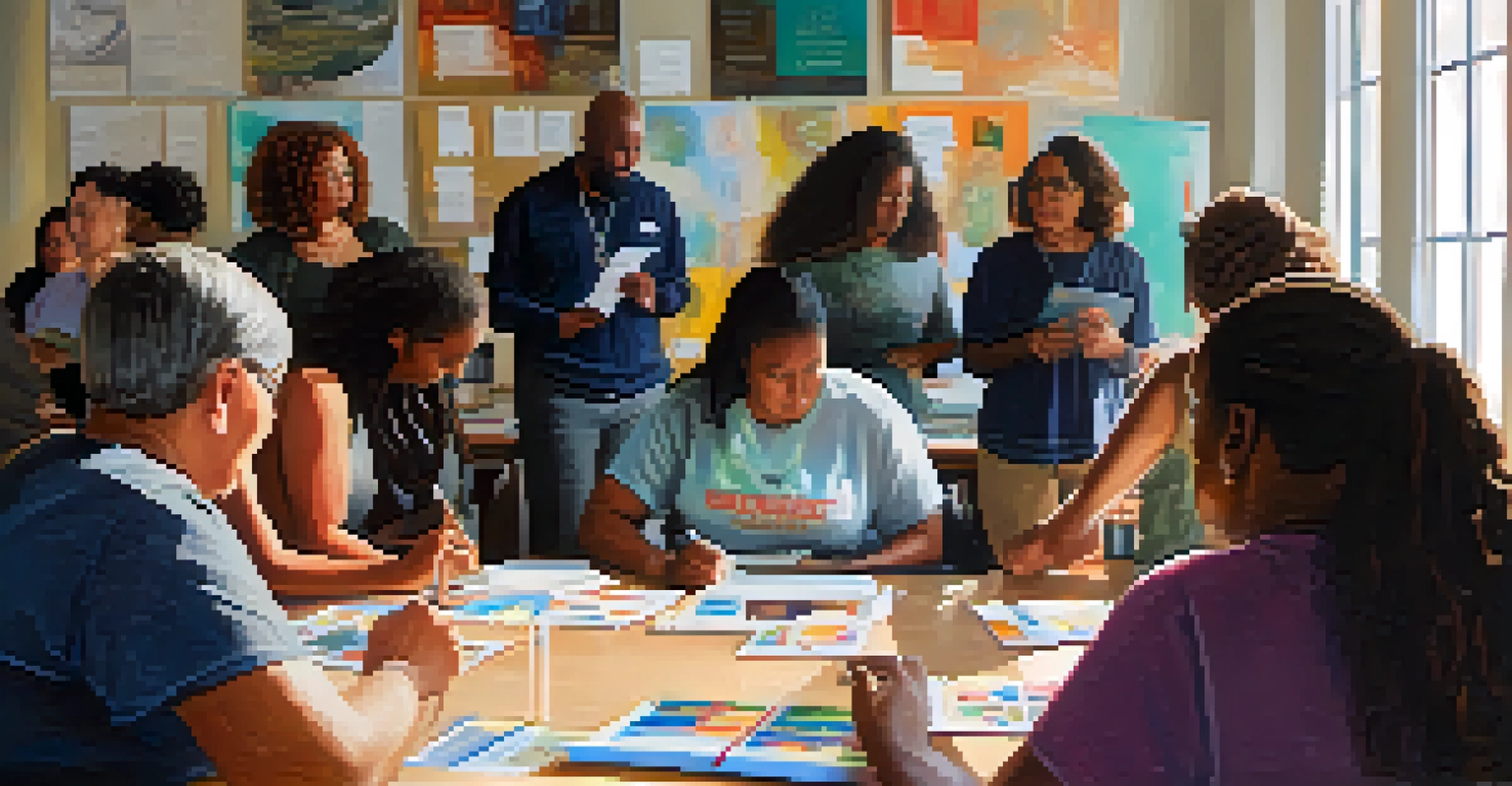Nonprofit Organizations in Minneapolis: Fighting Social Injustice

Understanding Social Injustice in Minneapolis
Social injustice refers to the unfair treatment and inequality faced by marginalized groups. In Minneapolis, this issue is particularly pronounced, with communities of color, low-income families, and the LGBTQ+ population often facing systemic barriers. Acknowledging these injustices is the first step toward creating meaningful change.
Injustice anywhere is a threat to justice everywhere.
The George Floyd incident in 2020 highlighted the deep-rooted issues of racial inequality and police violence, sparking nationwide protests. This tragic event galvanized many nonprofits in Minneapolis to take action and advocate for social justice reforms. Understanding the local context of these injustices helps nonprofits tailor their missions to address the specific needs of the community.
By examining social injustice in Minneapolis, we can appreciate the urgency and necessity of nonprofit organizations in the area. They serve as vital catalysts for change, working tirelessly to uplift those who have been marginalized and fight against the systemic issues that perpetuate inequality.
Key Nonprofits Making a Difference
Minneapolis is home to several nonprofits dedicated to fighting social injustice, each with its unique approach and mission. Organizations like the American Indian Movement (AIM) focus on advocating for the rights of Indigenous peoples, while others, like the Minnesota Coalition for the Homeless, address housing inequality. These nonprofits provide essential services and support to those affected by social injustices in the community.

Another significant player is the Black Visions Collective, which works to dismantle systemic racism and uplift Black communities. Their initiatives often include community organizing, education, and direct support for those impacted by violence and discrimination. By creating safe spaces for dialogue and action, they empower individuals to become advocates for themselves and their communities.
Social Injustice in Minneapolis
Minneapolis faces significant social injustices, particularly affecting marginalized communities like people of color, low-income families, and the LGBTQ+ population.
These nonprofits not only address immediate needs but also work towards long-term systemic change. By collaborating with local communities, they ensure that their programs are relevant and impactful, directly responding to the unique challenges faced by those they serve.
Community Engagement: The Heart of Nonprofit Work
Community engagement is vital for nonprofits to understand the needs and experiences of the populations they serve. Many organizations in Minneapolis prioritize building relationships and trust within the community, ensuring that their efforts are grounded in the lived experiences of individuals. This approach fosters a sense of ownership and empowerment among community members.
The time is always right to do what is right.
For example, some nonprofits host regular community forums and workshops, encouraging open dialogue about social justice issues. These gatherings allow individuals to voice their concerns, share their stories, and collaborate on solutions. By listening to the community, nonprofits can adapt their strategies and programs to better serve those in need.
When community members feel valued and heard, they are more likely to engage with nonprofit initiatives. This mutually beneficial relationship not only enhances the effectiveness of social justice work but also strengthens community bonds, creating a united front against social injustice.
The Role of Advocacy in Social Justice
Advocacy is a crucial aspect of nonprofit organizations' efforts to combat social injustice. By raising awareness about pressing issues and lobbying for policy changes, nonprofits can influence the decisions that affect marginalized communities. This proactive approach helps to address the root causes of inequality rather than just treating the symptoms.
In Minneapolis, many nonprofits engage in advocacy campaigns that target local government and institutions. They often collaborate with other organizations to amplify their voices and create a more significant impact. For instance, initiatives focused on police reform and affordable housing have gained traction due to the collective efforts of various advocates.
Nonprofits Drive Change
Local nonprofits play a crucial role in addressing social injustices, providing essential services and advocating for systemic reforms.
Through advocacy, nonprofits not only push for change but also educate the public about social justice issues. By providing information and resources, they empower individuals to become informed advocates themselves, fostering a more engaged and aware community.
Fundraising and Support for Nonprofits
Fundraising is vital for nonprofits to sustain their operations and continue their social justice work. In Minneapolis, many organizations rely on grants, donations, and community support to fund their programs and initiatives. Creative fundraising events, such as benefit concerts and community dinners, help raise awareness while generating necessary funds.
Support from local businesses and individuals can significantly impact the effectiveness of nonprofits. When community members contribute their time, resources, or skills, they bolster the organizations' efforts to combat social injustice. This collaborative spirit fosters a sense of unity and shared purpose within the community.
Additionally, online fundraising platforms have made it easier for nonprofits to reach a broader audience. By leveraging social media and digital marketing, organizations can share their missions and connect with potential supporters, ensuring they have the resources needed to make a difference.
The Impact of Education and Awareness
Education plays a crucial role in fighting social injustice, and many nonprofits in Minneapolis prioritize this aspect in their programming. By providing workshops, seminars, and educational resources, they help raise awareness about social justice issues and empower individuals with the knowledge needed to advocate for change. This focus on education fosters a more informed community.
For instance, nonprofits may offer training on topics such as racial equity, community organizing, and the importance of civic engagement. These educational initiatives equip individuals with the tools and understanding necessary to challenge injustices within their communities. By building a knowledgeable base of advocates, nonprofits can create a ripple effect that extends far beyond their immediate efforts.
Community Engagement is Key
Engaging with the community fosters trust and empowers individuals, enhancing the effectiveness of nonprofit initiatives aimed at social justice.
Moreover, education and awareness campaigns often encourage dialogue and reflection within the community. By fostering discussions around social justice issues, nonprofits can help dismantle stereotypes and promote empathy, ultimately leading to a more inclusive and equitable society.
Future Challenges and Opportunities
As the landscape of social justice continues to evolve, nonprofits in Minneapolis face both challenges and opportunities. Issues like funding cuts, political changes, and shifting community needs require nonprofits to be adaptable and innovative in their approaches. Staying responsive to these changes is essential for continued effectiveness in fighting social injustice.
One significant challenge is ensuring that marginalized voices are heard and represented within the nonprofit sector. As organizations seek to address systemic inequalities, they must prioritize inclusivity and equity within their own ranks. This commitment to diversity not only enhances the effectiveness of their work but also builds trust within the community.

Despite these challenges, there are also numerous opportunities for growth and collaboration. By forming partnerships with other organizations, nonprofits can pool resources and knowledge, amplifying their impact. As community awareness of social justice issues grows, there is potential for even greater support and engagement, paving the way for a more just and equitable future.